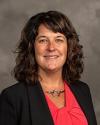Together, We Can: Clinical Instructor Laura Prochnow, DNP, RN, CHSE

"Together, We Can” is a series of stories featuring U-M School of Nursing faculty members who will be guiding our students through their nursing education amid the challenges of the COVID-19 pandemic. Through this series, you will learn about the people at the U-M School of Nursing who make it possible for our students to feel safe and secure as they learn and grow into Michigan Nurses.
Laura Prochnow has been a nurse for 30 years, practicing in the emergency department and cardiovascular specialty settings. For the last 14 years, she’s also been an educator, and this fall she is guiding juniors in the BSN program through the medical-surgical course and their all-important clinical rotation in Michigan Medicine’s Medical Short Stay Unit.
“I really work with them on developing their critical thinking skills, taking what they've learned their sophomore year, along with what they're currently learning in the classroom, and applying that to a patient's situation,” she said.
Prochnow knows it’s never easy to jump into a fast-paced clinical environment, especially as a student. That’s why she uses her own experiences to help them understand what it takes to provide a safe course of patient care.
“I share with them mistakes I made. We're all going to make mistakes, we're human,” she acknowledged. “But what makes us become great nurses is learning from our mistakes. That's something I try to portray to the students. Even though I've been a nurse for a long time, I’m still asking questions.

Hear Prochnow discuss new approaches to clinical instruction, the importance of connecting with students and strategies to ensure safety without sacrificing an essential learning experience.
Like many of her colleagues leading clinical courses this fall, Prochnow emphasizes open communication as one of the most important ways to keep students safe. Building personal connections has always been a hallmark of her teaching style, and now, as honest conversations about physical and mental health have added importance, those connections can create a safer environment for students and their patients.
“In today’s new health care environment, it’s more important that nurses prioritize self-care. I'm checking in with my students every day and letting them know that it’s OK to miss a clinical rotation if they are not feeling well,” said Prochnow. “This hasn’t always been the case. I can't tell you how many times I went to work sick, because if I didn't go there was nobody there to take care of patients.
“That's the biggest thing I'm trying to communicate to my students — call, text or email me before you get to clinical if you’re not feeling well. I want to be that sounding board for them and let them know we will find a way to make it up safely.”
Prochnow admits that new safety measures like social distancing require her and her students to adapt, but that doesn’t have to diminish one of the most pivotal clinical experiences in the BSN program.
“Even though we're standing apart, we can still connect. I'm still here to ask questions, to bounce ideas off of — we're doing it differently, but we're still able to achieve the same goal, just in a safer atmosphere.”





